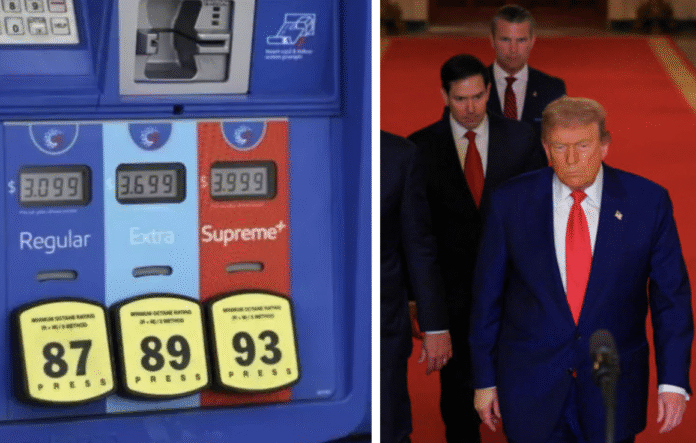Key Point Summary – Gas Prices Soar After Trump Hits Iran
- Trump’s Iran strike triggers global oil spike
- Gas prices in U.S. set to rise sharply
- Brent Crude jumped 11% in one week
- Markets react with uncertainty and volatility
- Iran threatens to close Strait of Hormuz
- Experts predict long-term pump pain for Americans
- Russia profits as war in Ukraine drags on
Conflict Abroad, Crisis At Home
Americans braced for a financial blow this weekend—not from inflation, not from recession—but from war.
After President Donald Trump launched a surprise military strike on Iran’s top nuclear sites Saturday night, gas prices in the U.S. are already climbing—and experts warn they’re just getting started.
Three nuclear targets—Fordow, Natanz, and Isfahan—were hit in what Trump called a “very successful attack.” But while planes safely returned home, the global oil market exploded into chaos.
Middle East Blows, Oil Spikes
Trump’s Truth Social post hailed the operation and called for peace. But the reality on the ground—and in financial markets—tells a different story.
Oil prices soared immediately. Brent Crude, the international benchmark, surged 11% over the past week and is expected to continue its climb Monday. Analysts say the market’s earlier hopes of a U.S.-Iran deal vanished the moment bombs dropped.
Financial firms are now scrambling to assess the fallout.
Markets React With Fear, Not Relief
“This move shocked everyone,” said Mark Spindel, chief investment officer at Potomac River Capital in D.C. “Markets will open in a panic. The risk is everywhere—volatility, price shocks, even supply disruptions.”
Spindel believes uncertainty will dominate. “The president called it ‘done,’ but we’re very much in it. There’s no damage report yet. No clarity. Only questions.”
Traders expect wild swings when global markets reopen. The dollar, oil futures, and energy sector stocks are expected to whiplash depending on headlines from Tehran, Tel Aviv, or Washington.
Peace Or Panic? The World Waits
Harris Financial’s Jamie Cox offered a different take. “Oil is sure to spike on this news, but it might stabilize in days,” he said. “Iran has lost leverage. With this show of force, they’ll probably look for the exit ramp to a peace deal.”
Still, investors aren’t so optimistic. “If this escalates—if Iran retaliates against oil routes or U.S. forces—then we could see $6 gas again,” one Wall Street strategist warned.
And the danger signs are already flashing.
Hormuz Threat Raises Global Stakes
Iran responded quickly, threatening to shut down the Strait of Hormuz—the world’s most vital oil artery. Roughly 20% of global crude passes through that chokepoint.
Greg Kennedy, director at King’s College London, says that move alone could ignite a global panic. “This is no longer just a regional event. This affects every tank, every refinery, every pipeline on the planet.”
“If Iran makes good on that threat, supply fears will spike. Nations will hoard. Prices will surge. The dominoes are lined up,” Kennedy added.
Gas Prices Already Moving
At the pump, the ripple effect has begun. In California, some stations posted prices above $5.25 on Sunday. Midwest prices jumped 30 cents overnight. Analysts say national averages could hit $4.50 within a week if tensions continue.
Drivers are feeling it. “We just got a little relief from inflation,” said one Chicago commuter. “Now it’s back to budgeting for gas like it’s gold.”
Families in Texas and Florida reported long lines at discount gas chains. Some refineries are reportedly preparing for supply chain shocks.
War Profits: Russia Gains As Ukraine Bleeds
There’s another twist.
As prices rise, so do profits—for some.
Russian oil exports from the Urals region jumped 26% in the past month. That means Vladimir Putin, already deeply entrenched in the war in Ukraine, gains billions from the chaos.
“This war shock benefits Russia directly,” Kennedy warned. “It allows Putin to fund his invasion longer. It gives him a reason to avoid peace. It’s a global conflict multiplier.”
Western allies worry that rising oil revenues could embolden not just Putin, but other authoritarian regimes watching closely.
Trump’s Warning: Peace Now Or Else
Trump, meanwhile, remains defiant.
“All planes are home. The operation was a success. Now is the time for peace,” he wrote.
But experts say the door to diplomacy has narrowed. Tehran could retaliate again, possibly targeting U.S. troops in Iraq or proxy targets elsewhere in the Gulf. If it does, Trump has promised more firepower.
Iran’s next move will determine the world’s economic pain—or relief.
Outlook: Gas Prices Set To Climb
The energy sector is now on high alert. Oil companies are bracing for supply chain breakdowns. Airlines are adjusting fuel hedges. Trucking companies are revising routes.
And the average American? They’re watching gas meters spin faster than ever.
“This isn’t just about gas,” Kennedy said. “It’s about food delivery, shipping, airline tickets, manufacturing. Energy costs touch everything.”
In short: what happened in Iran on Saturday night could echo through every American wallet for months to come.
Unless peace prevails soon, gas prices will keep rising. And Americans, once again, will pay the price.




